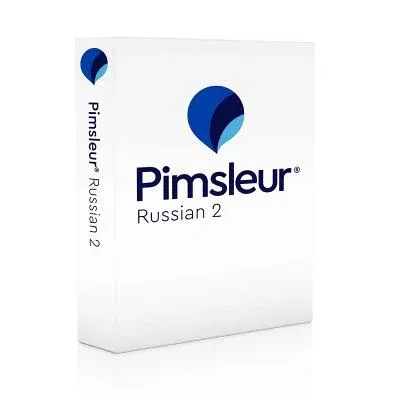Pimsleur
(Author)Pimsleur Russian Level 2 CD: Learn to Speak and Understand Russian with Pimsleur Language Programs (, 30 Lessons, Plus Reading Instruction)Compact Disc - , 30 Lessons, Plus Reading Instruction, 17 April 2018


Description
The Easiest and Fastest Way to Learn Russian
Whether you want to travel, communicate with friends or colleagues,
reconnect with family, or just understand more of what's going on in the
world around you, learning Russian will expand your horizons and
immeasurably enrich your life.
The best part is that it doesn't have to be difficult or take years to master. Thirty minutes a day is all it takes, and we get you speaking right from the first day. Pimsleur courses use a scientifically-proven method that puts you in control of your learning. If you've tried other language learning methods but found they simply didn't stick, then you owe it to yourself to give Pimsleur a try.
Why Pimsleur?
- Quick + Easy - Only 30 minutes a day.
- Portable + Flexible - Core lessons can be done anytime, anywhere, and easily fit into your busy life.
- Proven Method - Works when other methods fail.
- Self-Paced - Go fast or go slow - it's up to you.
- Based in Science - Developed using proven research on memory and learning.
- Cost-effective - Less expensive than classes or immersion, and features all native speakers.
- Genius - Triggers your brain's natural aptitude to learn.
- Works for everyone - Recommended for ages 13 and above.
What's Included?
- 30, 30-minute audio lessons
- 60 minutes of reading instruction to provide you practice reading Russian
- In total, 16 hours of audio, all featuring native speakers
- a Reading Booklet
What You'll Learn
Builds upon skills taught in Pimsleur's Russian Level 1.
In the first 10 lessons you'll begin using the past tense. Structures become more complex and informal speech is introduced. Soon you'll take part in conversations about ordering meals, shopping, and local tourist attractions. As you progress, your fluency will increase as your vocabulary expands.
The next 10 lessons will allow you to further combine and build upon known elements, and produce longer and more complex sentences. You'll be discussing business and social activities, expressing your interests, and talking about the weather.
In the final 10 lessons you'll double your vocabulary and have several hundred structures to draw upon. You'll learn to express yourself with relative structures - faster, slower, etc. You'll be able to ask for assistance in many situations and to ask for directions to various locations. You'll explore sports and leisure activities, manage changing money and banking, and discuss travel plans. By the end of the program, you'll be speaking at a mid-intermediate level with near-native pronunciation, and you'll be comfortable meeting most social demands and limited job requirements.
Reading Lessons, which build upon the reading skills acquired in Level 1, are included at the end of Lesson 30. These lessons, which total about one hour, are designed to give you practice reading Russian.
The Pimsleur Method
We make no secret of what makes this powerful method work so well. Paul
Pimsleur spent his career researching and perfecting the precise
elements anyone can use to learn a language quickly and easily. Here are
a few of his "secrets"
The Principle of Anticipation
In the nanosecond between a cue and your response, your brain has to
work to come up with the right word. Having to do this boosts retention,
and cements the word in your mind.
Core Vocabulary
Words, phrases, and sentences are selected for their usefulness in
everyday conversation. We don't overwhelm you with too much, but
steadily increase your ability with every lesson.
Graduated Interval Recall
Reminders of new words and structures come up at the exact interval for
maximum retention and storage into your long-term memory.
Organic Learning
You work on multiple aspects of the language simultaneously. We
integrate grammar, vocabulary, rhythm, melody, and intonation into every
lesson, which allows you to experience the language as a living,
expressive form of human culture.
Learning in Context
Research has shown that learning new words in context dramatically
accelerates your ability to remember. Every scene in every Pimsleur
lesson is set inside a conversation between two people. There are no
drills, and no memorization necessary for success.
Active Participation
The Pimsleur Method + active learner participation = success. This
method works with every language and every learner who follows it. You
gain the power to recall and use what you know, and to add new words
easily, exactly as you do in English.
The Russian Language
Russian, one of the six official languages of the United Nations, is the
official language in Russia, Belarus, Kazakhstan and Krygystan, with an
estimated 150 million native speakers around the world. Pimsleur's
Russian uses speakers from Moscow and St. Petersburg, which accounts for
slight pronunciation differences between speakers, but accurately
depicts contemporary spoken Russian.
Tech Talk
- CDs are formatted for playing in all CD players, including car players, and users can copy files for use in iTunes(R) or Windows Media Player(R).